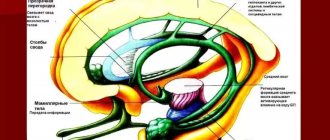Test with answers on the topic: “Morals and ethics”
I option.
1. Ethics is a philosophical science that studies a) morality + b) nature c) being d) law
2. An act as a primary element of morality does NOT include... a) intention b) goal c) consequence of an act d) moral norms+
3. In what aspect is the term “morality” understood? a) morality as a type of legal responsibility b) morality as a source of Russian law c) morality as a special form of social consciousness + d) morality as a way to achieve a goal
4. Lawyers for their actions and decisions in the professional field... a) bear increased responsibility + b) bear the same responsibility as everyone else c) bear reduced responsibility d) do not bear any responsibility
5. Morality as a way of regulating human behavior in society is ... a certain set of rights and obligations of the parties a) a system of principles and norms + b) the consciousness of people c) a special structure of legal relations
6. The Latin word “mores” is translated as... a) politeness b) interaction c) relationships d) morals+
7. The category of ethics, which characterizes a person from the point of view of his fulfillment of moral requirements, compliance of his moral activity with moral duty, considered from the standpoint of the individual’s capabilities, is ... a) honor b) justice + c) responsibility d) dignity
8. Concepts of moral consciousness, in which the requirements placed on people are expressed in the form of an image of a morally perfect person, an idea of a person who has absorbed the highest moral qualities - these are ... a) moral aspirations b) moral laws c) moral ideals + d ) moral dogmas
9. According to M. S. Strogovich, the social norms operating in society that regulate the actions, behavior of people, their relationships are ... a) morality + b) ethics c) religion d) ideology
10. Moral principles apply to a) only lawyers b) only those people who agree with such principles c) only the clergy d) all people+
11. The basic concepts of ethical science, which reflect the most essential elements of morality, are ... a) dictionary of ethics b) thesaurus of ethics c) categories of ethics + d) principles of ethics
12. According to A. S. Koblikov, the main function of morality is considered ... a) regulatory + b) prognostic c) communicative d) orienting
13. The term “moral norms” means a) norms ensured by state coercion b) norms adopted among members of a particular organization c) norms governing property relations, as well as non-property relations associated with property d) social norms governing human behavior in society, his attitude towards other people, towards society and towards himself+
14. In moral relations, a person acts as: a) a way of regulating social relations b) a subject in relation to society, a social group, etc.+ c) a subject of research d) an object of moral duties for others+
15. Categories of ethics are... a) the general and special parts of ethical science b) the concepts of ethical science that do not reflect the most essential elements of morality c) all the concepts and terms of ethical science d) the basic concepts of ethical science that reflect the most essential elements of morality+
16. The category of ethics, which in its content is opposite to good, expresses the idea of what contradicts the requirements of morality and deserves condemnation - this is ... a) evil + b) justice c) good d) misfortune
17. A person’s subjective awareness of his responsibility to society, which acts as a duty and responsibility to himself, is... a) conscience + b) happiness c) dignity d) honor
18. Professional ethics plays an important role, especially for professions whose object is ... a) law b) state c) person + d) culture
19. The category of ethics, which means a person’s special moral attitude towards himself and society’s attitude towards him, based on humanistic ideas, is... a) duty b) dignity+ c) honor d) reputation
20. Self-esteem, which is one of the oldest intimate-personal regulators of people’s behavior, is ... a) good b) good c) conscience + d) justice
Option II.
1. Moral sanctions include: a) moral approval+ b) state coercion c) legal sanctions d) moral encouragement+
2. Social norms that regulate a person’s behavior in society, his attitude towards society and towards himself are... a) moral norms + b) corporate norms c) conflict of laws norms d) legal norms
3. Morality is measured by the level of a) social and individual consciousness + b) technical development c) welfare of the population d) material needs of the population
4. Humanism is a) selfless service to one’s neighbor b) preference of one’s own interests over the interests of others c) conscious desire to promote the common good d) recognition of man as the highest value+
5. If a moral norm specifies what specific actions a person should perform, how he should behave in typical situations, then the moral principle gives a person... a) rights and freedoms b) the opportunity to carry out activities c) a set of techniques and methods for carrying out activities d) general area of activity+
6. According to M. S. Strogovich, views, beliefs, ideas about good and evil, about worthy and unworthy behavior are... a) etiquette b) ethics c) law d) moral consciousness+
7. By “moral ethics” is meant: a) the doctrine of. how a person should act + b) the doctrine of the laws of development of society c) the doctrine of the laws of existence d) the doctrine of morality
8. The Latin word “moralis” is translated as ... a) justice b) value c) morality + d) humanism
9. The doctrine of how a person should act, what principles and norms he must follow is ... a) predictive ethics b) moral ethics + c) empirical ethics d) applied ethics
10. When there is a preference for one’s own interests over the interests of others, this is... a) egoism+ b) idealism c) materialism d) formalism
11. As a science, how long has ethics existed? a) more than 20 centuries+ b) more than 10 centuries c) from the end of the 18th century d) from the 4th century BC
12. What is ethics? a) which studies virtues b) about generally accepted and repeated forms of human behavior c) about morality, ethics + d) about morals, customs
13. Select what ethical standards are paid attention to within Western European culture? a) benefit, benefit, hard work b) justice, goodness, goodness+ c) honor, freedom, faith
14. Define what morality is? a) rules generally accepted within a social community (group), patterns of behavior or action in a certain situation b) a form of social consciousness that reflects ideas, ideas, principles and rules of behavior of people in society + c) generally accepted and repeated forms of behavior of people that serve as a means of transferring social and cultural experience from generation to generation d) rules of behavior of people when performing rituals and forms of activity
15. Social norms are: a) rules generally accepted within a social community (group), patterns of behavior or action in a certain situation + b) a form of social consciousness that reflects ideas, ideas, principles and rules of behavior of people in society c) generally accepted and repeating forms of human behavior that serve as a means of transmitting social and cultural experience from generation to generation d) rules of behavior of people when performing rituals and forms of activity
16. Traditions – a) rules of behavior that are established and protected by the state. b) represent rules of behavior that are established by public organizations themselves and are protected through measures of social influence provided for by the charters of these organizations. c) spiritual and moral rules of human society, based on people’s idea of God as the creator of the universe. d) the most generalized and stable rules of behavior of people in a particular society, which have been verified by time and have existed for a long time.+
17. The ethical monument “Domostroy” belongs to this country: a) Ancient Greece b) India c) Russia+
18. The norms of public organizations are: a) the most generalized and stable rules of behavior of people in a particular society, which have been verified by time and have existed for a long time. b) rules of behavior that are established and protected by the state. c) rules of behavior that are established by public organizations themselves and are protected through measures of social influence provided for by the charters of these organizations. + d) generally accepted and repeated forms of human behavior that serve as a means of transmitting social and cultural experience from generation to generation.
19. “Deontology” studies: a) the doctrine of rules of conduct b) the doctrine of social mores and customs c) the doctrine of problems of morality and morality, the section of ethics +
20. Founded ethics: a) Plato (428-328 BC) b) the great ancient Greek philosopher Socrates (469-399 BC)+ c) Aristotle (384-322 BC) d) Seneca (4 BC – 65 AD)
Morality. Functions of morality, its structure and elements
Lecture No. 4. Morality. Functions of morality, its structure and elements.
The purpose of the lecture: to introduce the concept and essence of morality, the main elements of the structure of morality, the functions of morality, the principles and moral standards of a law enforcement officer.
Questions to the topic:
- The concept and essence of morality.
- Basic elements of the structure of morality.
- Functions of morality.
- Principles and moral standards of a law enforcement officer.
1. The concept and essence of morality.
Morality (from the Latin “moralis” - moral; “mores” - mores) is one of the ways of normative regulation of human behavior, a special form of social consciousness and a type of social relations. There are a number of definitions of morality that highlight certain of its essential properties.
Morality is a system of principles and norms that determine the nature of relations between people in accordance with the accepted concepts of good and evil, fair and unfair, worthy and unworthy in a given society. Compliance with moral requirements is ensured by the power of spiritual influence, public opinion, inner conviction, and the conscience of a person. A special feature of morality is that it regulates the behavior and consciousness of people in all spheres of life (production activity, everyday life, family, interpersonal and other relationships). Morality also extends to intergroup and interstate relations.
Moral principles have universal significance, embrace all people, and consolidate the foundations of the culture of their relationships, created in the long process of historical development of society.
Every act and behavior of a person can have a variety of meanings (legal, political, aesthetic, etc.), but its moral side, moral content is assessed on a single scale. Moral norms are daily reproduced in society by the power of tradition, the power of a generally recognized and supported discipline, and public opinion. Their implementation is controlled by everyone.
Responsibility in morality has a spiritual, ideal character (condemnation or approval of actions), appears in the form of moral assessments that a person must realize, internally accept and accordingly direct and correct his actions and behavior. Such an assessment must correspond to general principles and norms, accepted by all concepts of what is due and what is not due, what is worthy and what is unworthy, etc.
Morality depends on the conditions of human existence, the essential needs of man, but is determined by the level of social and individual consciousness. Along with other forms of regulating the behavior of people in society, morality serves to coordinate the activities of many individuals, transforming them into aggregate mass activity, subject to certain social laws.
Morality was interpreted as the fulfillment of divine institutions, and as the experience of worldly wisdom, and as a school of human upbringing, and as the focus of human virtues, and as the highest satisfaction of an individual with his behavior, and as a sublime service to honor, and as an indisputable fulfillment of duty, and as an instrument of ensuring social stability, and as a requirement for public benefit, etc.
2. Basic elements of the structure of morality.
The structure of morality consists of the following components:
Moral activity is the most important and determining component of morality, manifested in actions. An act contains three components: motive - morally - a conscious urge to commit an act; result - the material or spiritual consequences of an action that have a certain meaning; assessment by others of both the act itself and its result and motive.
Moral relationships are those relationships that people enter into when performing moral actions. By entering into moral relations, people assume certain moral obligations and at the same time acquire certain moral rights. Moral relations in the service team are divided into subordinated ones - relations between a boss and a subordinate, relations between colleagues, relations with citizens.
Moral consciousness includes cognition, knowledge, volitional impulse and determining influence on moral activity and moral relations.
3. Functions of morality.
Investigating the question of the functions of morality, we distinguish:
- regulatory;
- educational;
- cognitive;
- evaluative-imperative;
- orienting;
- motivational;
- communicative;
- prognostic.
Of primary interest to lawyers are such functions of morality as regulatory and educational. The regulatory function is considered the leading function of morality. Morality guides and corrects the practical activities of people from the point of view of taking into account the interests of other people and society. At the same time, the active influence of morality on social relations is carried out through individual behavior.
The educational function of morality is that it participates in the formation of the human personality and its self-awareness. Morality contributes to the formation of views on the purpose and meaning of life, a person’s awareness of his dignity, duty to other people and society, the need to respect the rights, personality, and dignity of others. This function is usually characterized
as humanistic.
Morality is considered both as a special form of social consciousness, and as a type of social relations, and as norms of behavior operating in society that regulate human activity and moral activity.
Moral consciousness is one of the elements of morality, representing its ideal, subjective side. Moral consciousness prescribes certain behaviors and actions to people as their duty. Moral consciousness evaluates various phenomena of social reality (an action, its motives, behavior, lifestyle, etc.) from the point of view of compliance with moral requirements. This assessment is expressed in approval or condemnation, praise or blame, sympathy and dislike, love and hatred. Moral consciousness is a form of social consciousness and at the same time the area of individual consciousness of the individual. In the latter, an important place is occupied by a person’s self-esteem, associated with moral feelings (conscience, pride, shame, repentance, etc.).
The concept of morality is not identical to the concept of moral consciousness. Moral consciousness is views, beliefs, ideas about good and evil, worthy and unworthy behavior, and morality is the social norms operating in society that regulate the actions, behavior of people, and their relationships.
Moral relations arise between people in the process of their activities that have a moral character. They differ in content, form, and method of social communication between subjects. Their content is determined by to whom and what moral responsibilities a person bears (to society as a whole; to people united by one profession; to a team; to family members, etc.).
In moral relations, a person acts both as a subject and as an object of moral activity. Thus, since he bears responsibilities to other people, he himself is a subject in relation to society, a social group, etc., but at the same time he is an object of moral duties for others, since they must protect his interests, take care of him, etc. d.
Moral activity represents the objective side of morality. We can talk about moral activity when an act, behavior, and their motives can be assessed from the standpoint of distinguishing between good and evil, worthy and unworthy, etc. The primary element of moral activity is an act (or misdemeanor), since it embodies moral goals, motives or orientations . An action includes: motive, intention, purpose, action, consequences. The moral consequences of an action are a person’s self-esteem and evaluation by others.
The totality of a person’s actions that have moral significance, performed by him over a relatively long period in constant or changing conditions, is usually called behavior. A person’s behavior is the only objective indicator of his moral qualities and moral character.
Moral activity characterizes only actions that are morally motivated and purposeful. The decisive factor here is the motives that guide a person, their specifically moral motives: the desire to do good, to realize a sense of duty, to achieve a certain ideal, etc.
In the structure of morality, it is customary to distinguish between the elements that form it.
Morals include:
- moral standards;
- moral principles;
- moral ideals;
- moral criteria.
Moral norms are social norms that regulate a person’s behavior in society, his attitude towards other people, towards society and towards himself. Their implementation is ensured by the power of public opinion, internal conviction based on the ideas accepted in a given society about good and evil, justice and injustice, virtue and vice, due and condemned.
A moral norm is, in principle, designed for voluntary fulfillment. But its violation entails moral sanctions, consisting of a negative assessment and condemnation of a person’s behavior, and directed spiritual influence. They mean a moral prohibition to commit similar acts in the future, addressed both to a specific person and to everyone around him. Moral sanction reinforces the moral requirements contained in moral norms and principles.
Violation of moral standards may entail, in addition to moral sanctions, sanctions of a different kind (disciplinary or provided for by the norms of public organizations).
Moral norms can be expressed both in a negative, prohibitive form (for example, the Mosaic Laws - the Ten Commandments formulated in the Bible) and in a positive form (be honest, help your neighbor, respect your elders, take care of your honor from a young age, etc.).
Moral principles are one of the forms of expression of moral requirements, in the most general form revealing the content of morality existing in a particular society. They express fundamental requirements concerning the moral essence of a person, the nature of relationships between people, determine the general direction of human activity and underlie private, specific norms of behavior. In this regard, they serve as criteria of morality. If the moral norm
prescribes what specific actions a person should perform, how to behave in typical situations, then the moral principle gives a person a general direction of activity. Moral principles include:
- humanism - recognition of man as the highest value;
- altruism - selfless service to one's neighbor;
- mercy - compassionate and active love, expressed in the readiness to help everyone in need of something;
- collectivism is the conscious desire to promote the common good.
In addition to the principles that characterize the essence of a particular morality, there are so-called formal principles that relate to the methods of fulfilling moral requirements.
Such, for example, are consciousness and its opposites, formalism, fetishism, fatalism, fanaticism, and dogmatism. Principles of this kind do not determine the content of specific norms of behavior, but also characterize a certain morality, showing how consciously moral requirements are fulfilled.
Moral ideals are concepts of moral consciousness in which the moral demands placed on people are expressed in the form of an image of a morally perfect personality, an idea of a person who embodies the highest moral qualities.
The moral ideal was understood differently at different times, in different societies and teachings. If Aristotle saw the moral ideal in a person who considers the highest virtue to be self-sufficient, detached from the worries and anxieties of practical activity, the contemplation of truth, then I. Kant characterized the moral ideal as a guide for our actions, “the divine man within us,” with whom we compare ourselves and we improve, but never, however, being able to become on the same level as him.
The moral ideal accepted by a person indicates the ultimate goal of self-education. We can also talk about a public moral ideal as an image of a perfect society built on the requirements of the highest justice and humanism.
Functions of morality:
Regulatory function - the function of moral regulation of relationships between people is the main and determining one. It covers that sphere of relations that is not regulated by law, and in this sense it complements law.
Evaluative function - any moral act is determined by one or another value system. The subject of assessment from the moral-immoral or moral-immoral angle are actions, attitudes, intentions, motives, moral views, etc.
Catalog
(From correspondence with self-identified jihadists
and declared a crusade against Duluman.
The full set of this correspondence will be posted on the website a little later)
CONTENT:
1. Jihadist ultimatums
2. The morality of faith in God and the morality of atheists.
3. Five levels of moral quality.
4. Jihadist morality? - Judge for yourself.
1. Jihadist ultimatums
In its challenge either to mortal combat or to the lists, the swamp of the jihad of the cross, headed by the Heresiarch, absorbing in its belly people of heterogeneous religious convictions (and without any convictions, too), the swamp gave Duluman a harsh and inevitable ultimatum: to any of them reply to the note within 72 hours. After 72 hours...
I don’t know (do cruciferous jihadists know?) what will happen for Duluman after 72 hours. “After this - death!” - Alexander Vasilyevich Suvorov warned the Turkish warriors who settled in the Izmail fortress. Or in Michurinsky: “There is no point in expecting mercy from nature...jihadists?” Or: “With our screaming from the beatings, we will disgrace you to the whole world for Herod’s beating of babies?”... But you never know what will come into the heads of unafraid jihadists?!
Yesterday I received a letter from the Chief Heresiarch with a request: what letters, what atheistic reproaches against the Bible should he, the Heresiarch, respond to?
Heresiarch! What are you asking me? You volunteered to chew Duluman publicly. Gnaw. In such cases, do they really ask: how, from which side and in what way to attack the intended enemy? And if you are asking so seriously, then I will answer just as seriously: bite and gnaw at my soft spot. This way you won’t break your teeth...
In every letter I ask you atheistic questions. Have you really forgotten? What time was Jesus Christ crucified? At three o'clock, as Evangelist Mark says? Or after six, as the Evangelist John says? Who killed Goliath the Gitite: David or Elchanan?..
However, I have enough atheistic provisions that are not pleasant for theologians in the Lecture on the Bible, in my responses to your attacks, in my other materials that exist on the sites. And don't shout "Lies!" “Lies”, “Rudeness!” against atheism, but show me where is the lie?, where is the lies?, where is rudeness?
2. The morality of faith in God and the morality of atheists.
Compare your statements about atheism and atheists with our statements about believers. We have never humiliated them, the believers. We understand and appreciate their personal worldviews. Have you said at least one kind word about atheists? For you, an atheist is, first of all, a vile, immoral type. But a believer, in your opinion, is always a highly moral person.
Why do you think so? What?, in the name of Allah, Hosts, Buddha, Jehovah, believers did not destroy each other? Highly moral believers Highly moral believers? Have you ever seen atheists destroy each other in the name of their atheism against the atheism of another person? By your logic, atheists should have been at each other's throats long ago. And to your regret, they don’t chew; tolerate each other and condescendingly favor believers.
When you judge the morality of atheists, you are putting yourself in the place of the atheist. Now, if you were atheists, you would commit all the heinous things that you now accuse atheists of.
In your, jihadists, exchange of opinions on how to fool Duluman (I have already answered you publicly to your pious and very godly plans), Gennady Cardinalov (or Komendantov) writes that the immorality of atheists is due to the fact that they are above themselves for no one. do not respond to their behavior. How come they don't answer? Morality is always taking responsibility for your behavior. But the level of this morality is always determined by those to whom the person feels responsible.
3. Five levels of moral quality.
1. The highest level of moral behavior is achieved when a person acts morally due to the fact that such is his nature. He, ideally, should act well, morally, not because God or someone else will give him a gingerbread or hit him in the neck. A person is responsible primarily to himself for his behavior. And only in this case is his morality genuine, without any selfish admixture, morality. This is the implementation of what Immanuel Kant called the Moral Imperative, the Moral Maxim. Here, a person’s personality never acts as a means for God, for society, for other people to achieve goals that lie outside the personality of a given person. This is the highest level and highest quality of moral behavior. It can only be inherent in an atheist. But only! This level of morality is achieved through education, training and self-education. Let's not say that this level is easily achieved. Very difficult!...However, now I will not talk about the implementation of the moral ideal. This is a topic for another discussion.
2. The next, also still high, level of moral state is the state of that morality that is measured by public benefit, service for others. (The first, highest level of morality includes elements of universal morality, public morality. The first, highest level of morality includes everything that is moral in all lower levels of morality, being cleared of dubious, immoral impurities.) On At this second level of morality, a person sees his moral postulates in serving society, the survival and prosperity of the human race (See my “Theorem on the meaning of life”). Society, in turn, demands self-sacrifice from the individual, regardless of his desires and personal interests. At this level of high morality, we see heroes, ascetics and all those thanks to whom society (and humanity) exists, lives and moves.
3. The third, below average level of morality is based on the fear of punishment and the thirst for reward from society (other people). The educator and indicator of the level of morality here is the Criminal Code, public awards and recognition, a sense of duty to parents, and so on and so forth. If you mess up society or people, society and people (friends, parents, co-workers) punish you; If you do a good deed and behave decently, you will be rewarded. They reward and punish materially, physically and spiritually, morally... It is within the framework of this average morality that humanity dangles in everyday life.
4. The fourth, low level of morality is the morality that is formed by religion. This low level of morality is called religious morality. This morality contains (retains) elements of universal morality, but these universal elements of morality are presented to man in the name of God, as something alien, dictated from the outside, behavior forcibly imposed on man and society. The inculcation of elements of universal morality by religion has its pros and cons. The advantages are that a person is presented with this and that behavior that has passed the centuries-old test, has justified itself in practice, and has been and is effective for the life of the individual and society. The sanctification of the elements of universal morality in the name of God raises certain rules of moral behavior to the height of Indisputable and Inevitably Mandatory. Thus, certain elements of moral behavior are supported by the highest authority of God.
But the disadvantages of this divine illumination of moral behavior are that divine sanctification prevents a person from cognizing the essence of moral behavior as human behavior and not divine behavior. This sanctification also preserves the customs and remnants of the past in society. It interferes with the development of morality itself. In this regard, religion, for example, cultivates a disdainful attitude towards women, towards strangers and people of other faiths, it prevents us from seeing harm and benefit in fasting or celebration, and so on. In religious morality, a person must behave in accordance with the will of God set forth by the clergy. And morality is not only good behavior, but also free expression of will. In religious morality, a person is deprived of choice, and therefore deprived of genuine moral behavior, even if religious recommendations are moral in their content.
Summarizing what has been said, it should be said that religion, as a form of social consciousness, contains elements of universal morality - elements of that moral behavior that have been historically developed and, by virtue of tradition, are maintained in a particular society (in the society of Europeans, or Arabs, or Chinese, or Jews, or in the Bindibu tribe...).
5, The lowest level of morality, which often merges with immorality, is morality that is based solely on personal faith in God. (As an atheist, I want to say that there is no God, and belief in the existence of this God is a belief that is fundamentally, from beginning to end, erroneous; that only erroneous morality can be built on erroneous beliefs. I want to say all this, but I won’t say all this now.) I ask my opponents to carefully read what is written: “morality, which is based solely on personal faith in God.” There is no talk of religious morality here. Religious morality is a morality that is based not on a person’s personal faith in God, but on religion as a form of social consciousness. Personal faith in God influences the personality of the believer. And religion as a form of social consciousness has its influence on society, including on people who do not believe in God.
A believer has the illusion that his behavior is controlled and dictated by God himself. In fact, for a believer, God himself is a reflection and indicator of his, the believer’s, own worldview and his own, the believer’s, own moral character. In this case, God does not personally dictate behavior to the believer, but serves as a justification for the believer’s behavior. Again, read what has been said: it is not God who personally dictates the believer’s behavior, but the present behavior (both good and bad) of the believer is justified by the God of this believer. And there is no behavior that God would not personally justify for one or another believer. In the name of his God, a believer can do everything: torture himself, give away his property to the poor, rob his neighbor, do harm to society, work for his neighbor... But in any of his moral behavior there is always a purely personal interest. Such a believer does good for the people of society not because society or his neighbors are so dear to him, but because his God tells him so and his God promises the believer this and that, and this and that for this... God promises for any behavior of the believer everything that his soul, a believer, desires: paradise, forgiveness of sins, elevation to sainthood - and everything, everything his soul desires. In the behavior of a believer (who, of course, exists) who bases his morality on God (who, of course, does not exist), his own selfish interests come first. After all, since his God is personal to him, this God is also organically connected with his personal interests, the believer.
The Christian teaching about forgiveness has a particularly destructive effect on the moral character of a believer who builds his morality on his personal faith in God... I am forced to briefly outline the Christian teaching about salvation: about the salvation of a person’s soul, in which, salvation, the believer sees the meaning of his life.
Christianity, based on the Bible, teaches that there is no person without sin, that every person is a sinner. (Don’t force me to cite biblical quotations and church canons now to confirm the teachings of Christianity that I have expressed. I will do this at another, convenient time.) So, all people are sinners. And only sinless people, saints, will be saved and go to the kingdom of God, to heaven. And if all people are sinners, then none of the people can be holy and cannot get into the Kingdom of God, cannot save their soul. Christianity and the Bible see a way out of the situation in human repentance. “Repent and you will be saved,” the Gospel teaches. It, the Gospel, says that there is no sin that God will not forgive a repentant person. But we need to repent. Repent of your sins. And in order to repent of sins, these sins must be worked out. No sin - no repentance. No repentance - no salvation. Based on these Christian moral dogmas, the famous Grishka Rasputin taught: “If you don’t sin, you won’t repent. If you don't repent, you will be saved. And therefore: the more you sin, the more you will repent, and the sooner you will enter the kingdom of God!”
Repentance, of course, is a good thing. A good thing, but not in the religious vision of this repentance. If society and friends demand that a member of society repent of what they have done and are satisfied with this, then this has a positive moral effect. Here you have spoiled society, people - in front of society, in front of people, you publicly expressed your awareness of your guilt, suffered a certain moral punishment, suffered, so to speak, moral wear and tear. But with morality, which is based on personal faith in God, the situation is completely different and the effect of repentance is purely negative. Here, with personal faith in God, the following picture emerges: a person does harm to society, to his neighbors, and experiences the moral wear and tear of repentance before God. You harmed one, and repented to the All-Forgiving One - and consider yourself a saint, consider yourself a highly moral person. Such a believer walks with deep conviction: “I really sinned with people, with society, but I repented of my sin to God. God has forgiven me. And if God has forgiven me, then I am pure before God. And if I am pure before God, then it doesn’t matter to me what people think about me, how they evaluate my behavior. For me, my personal God is everything, and people are nothing.”
However, thinking visitors to the site will then be able to analyze for themselves the situation of the behavior of a person who bases his morality on personal faith in God; people who are responsible for their behavior before God, but not before Society, their neighbors, not to mention - before the Greatness of their personality and their destiny. To cry out at prayers: “I am a worm, and not a man, a reproach to those who gobble and the humiliation of people” (I am a worm, and not a man, is a reproach among people and contempt among the people) - Psalm 21:7) and remain a worm, a reproach among people and despised among the people - this is not much of a moral dignity. One teacher said: “If you call a person a pig ten times in a row, he will grunt, and a dog, he will bark.”
4. Jihadist morality? - Judge for yourself.
And in conclusion, for illustration, I invite site visitors to reflect on the letter of a participant in the jihadist crusade against immoral atheists and, from this letter, determine the level of morality of a person who bases morality on personal faith in God. We will talk about Valentin Efimov. I don’t know what role the Heresiarch himself assigned to him in the hierarchy of the Crusader-Jihad Raspberry. Apparently he is number six among them, the lowest rung. He sends out jihadist letters, searched for (and found) me using my email addresses, which I had changed. He found my new address (although my old address is still working), sent me a letter four times, and when I answered all four of his letters, he began to act according to the algorithm of morality, which is based on personal faith in God. Denying his sixfold role in the jihadist raspberry, he writes to me with threats:
For those who are in the tank, I repeat for the last time: learn to distinguish between the authors and senders of letters. I have no desire to enter into any correspondence with the boors, whose prominent representative is Duluman. From now on, please do not write anything to my address - you know the heresiarch’s address, write to him. When you receive subsequent letters to my address, you will receive an email bomb or swap. Or something even worse. Dixi Best regards, Efimov
I, a professor who has not yet completed his education in modern computer and Internet jargon, am completely unaware of what a “mail bomb” is?, what a “swap” is?, and I am now incapable of imagining anything worse than my age. But I am grateful to Efimov for providing me with an illustration of what kind of “highly moral” individuals who are “responsible to God” are brought up by morality based on personal faith in God. Thank you, Valentin. And don’t be shy - wield your Wahhabi bombs and swaps and demonstrate to these irresponsible atheists before the Almighty the incomparable superiority of your morality on the basis of your personal faith in God.
With respect to those rushing between pricked pride and a non-existent God - Evgraf Duluman.
(Updated October 26, 2007)







